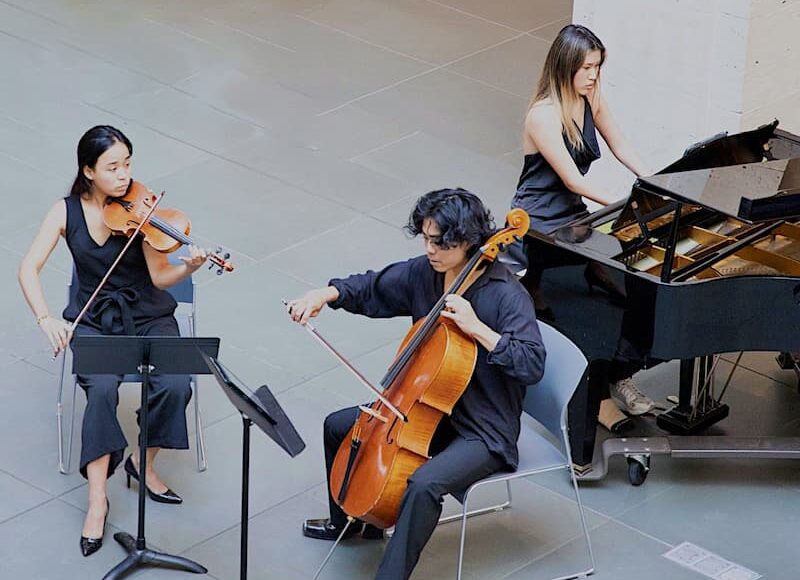Written by Haeun Moon
Haeun Moon, a 2024 graduate of Harvard College, served as the associate concertmaster of Carnegie Hall’s National Youth Orchestra, having soloed with the Dallas Symphony while still in high school. At Harvard she concentrated in Social Studies, with a secondary in Philosophy and a citation in Spanish. Since graduation, she has worked as a Research Associate for WolfBrown. She plans to attend law school.

When I graduated from Harvard and started working, I found myself reflecting on what my education had truly prepared me to do. My most valuable lessons didn’t come from technical training, but from the arts and humanities—from the hours I spent in practice rooms and seminar discussions, learning how to think, feel, and communicate with intention.
My violin training has shaped how I approach nearly everything in my life. Yes, it taught me discipline, perseverance, and how to bounce back from failure. But beyond those familiar lessons that one could glean from essentially any sustained pursuit, music taught me something deeper: how to connect. Every performance, every rehearsal, every exchange with another musician was an act of listening and understanding. I learned how to express something intimate and honest, and to reach toward someone else’s experience in return.
The same is true of my coursework in the humanities. In philosophy classes, I learned to build logical arguments and identify fallacies. In literature and history seminars, I learned how to interpret complex ideas and communicate them clearly. Those experiences didn’t just fill my head with facts; they trained me to think critically, to write persuasively, and to listen carefully. They shaped how I move through the world, as someone capable of understanding and connecting across difference.
And yet, despite all this, arts and humanities education is often dismissed as impractical. We hear, over and over, that it does not produce “employable” individuals, that it doesn’t offer a good return on investment, that it’s a luxury in an economy that prioritizes technical skills. Funding for these programs continues to shrink, replaced by courses that promise clearer job pathways. The logic seems simple: why major in philosophy when you could learn to code?
But I think that this reasoning misunderstands what most jobs actually require. Unless you’re entering a strictly skill-based profession like software engineering or lab research, most workplaces train you after you’re hired. You’re not being hired for a narrow technical ability; you’re being hired for how well you can think, communicate, and adapt.
Even recently, as I studied for the LSAT (the Law School Admissions Test), which is a standardized exam designed to measure logic and reasoning skills, I found that the classes that helped me most weren’t pre-law or policy courses. They were the philosophy seminars where I learned how to construct valid arguments, and the history, literature, and music classes that strengthened my reading comprehension. Those exercises in reasoning and interpretation have stayed with me far longer than any single formula or memorized fact.
In college, I often saw this play out among friends studying Applied Math, Statistics, or Economics. They would come to me for humanities course recommendations to fulfill a distribution requirement, and I’d always suggest The Art of Living with Professor Samantha Matherne or Existentialism in Film and Literature with Professor Sean Kelly. By mid-semester, those same friends—people who spent most of their time solving equations—would stop me in the dining hall, eager to talk about what they’d read. They’d debate Schopenhauer versus Schiller’s aesthetic philosophies or tell me how watching The Third Man had changed how they saw themselves. Many of them later said those were the most memorable and transformative classes they took in college.
So what does that say about arts and humanities education?
It tells us that these fields bring us closer to one another. In a world where it’s easy to talk past each other, the humanities teach us to listen, to interpret, and to engage with perspectives that challenge our own. They remind us that empathy is a form of intelligence.
It also shows that the skills these disciplines foster—critical thinking, adaptability, communication—are among the most employable qualities in today’s rapidly changing world. The arts and humanities train us to learn any job, and to do it thoughtfully and well. So yes, even as technical and specialized programs continue to grow more enticing, arts and humanities education remains essential. It teaches us how to think, but also how to engage the world as whole, feeling humans. And that, I believe, will always be a skill worth investing in.


